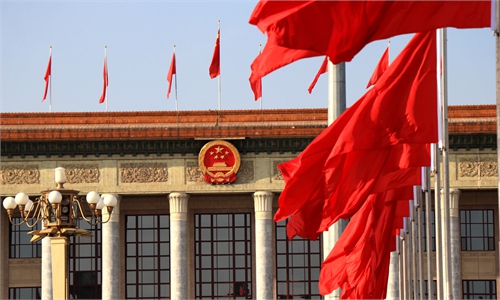
A view of the skyline of Beijing's CBD area. Photo: VCG
A series of fiscal policy measures that are set to be rolled out in the near future are expected to further boost confidence in the Chinese economy and underpin its stable growth to ensure the annual development target will be achieved, Chinese economists said on Sunday.
China's finance officials have pledged to introduce a package of targeted incremental fiscal policy measures soon, in keeping with the continuously intensifying policy support for the economy that has been announced over the past several weeks. These measures have significantly lifted expectations for the world's second-largest economy.
During a press conference in Beijing on Saturday, Minister of Finance Lan Fo'an announced that in addition to accelerating the implementation of policies that are already in place, a package of targeted incremental policy measures will be introduced soon, with the focus on stabilizing growth, expanding domestic demand and defusing risks.
The policy measures will focus on four aspects, including increased efforts to help tackle local government debt risks, expand special treasury bond issues to support commercial banks, and various policy tools to help stabilize the real estate market, according to the finance minister.
Among the policy measures, support will be strengthened for government to resolve debt risks, with the debt quota to be increased on a relatively large scale to tackle hidden risks, to enable local governments to free up more energy and financial resources to promote development and protect people's livelihoods, Lan said.
"It needs to be emphasized that this upcoming policy is the most powerful measure introduced in recent years to tackle debt issues. This is undoubtedly a timely policy that will greatly reduce the pressure on local efforts to tackle debt issues and free up more resources to develop the economy and boost the confidence of business entities," the finance minister said.
Many in China and around the world have been paying close attention to the specific amount of fiscal stimulus that will be offered to boost the economy, but Lan said that arrangements for the specific amount will be released to the public after going through legal proceedings.
The finance minister noted that local debt risks have been alleviated as a whole, and debt reduction work has achieved phased results, after the local government debt limit was fixed at over 2.2 trillion yuan in 2023, with an additional 1.2 trillion yuan arranged for 2024 to support local governments, especially high-risk areas, to resolve existing debt risks and other issues.
Significant boost
The upcoming policy is of great significance to tackle debt, which is one of the prominent issues faced by many local governments, said Cong Yi, a professor at the Tianjin School of Administration.
"This policy is clearly a long-awaited step in the development process of various regions, and it will undoubtedly assist local governments in addressing their current challenges, particularly in fiscal difficulties. It should be considered a very crucial policy move," Cong told the Global Times on Sunday.
Cong noted that the policy measures are very targeted, in that they aim to address risks and challenges that the economy currently faces. Equally importantly, the measures are also conducive to structural optimization that will ensure long-term stable development, the expert said.
Also among the forthcoming policy measures is a plan to issue special treasury bonds to support large state-owned commercial banks in replenishing their core tier-1 capital. This will improve the ability of the banks to guard against risks and expand credit to better serve the development of the real economy, according to Lan.
In terms of efforts to stabilize the real estate market, China will deploy a set of fiscal policy tools, including local government special-purpose bonds, special funds and taxation policies, the finance minister said.
Meanwhile, in addition to one-time living subsidies distributed to people facing difficulties before the National Day holidays, the country will further increase support for key groups, including increasing financial aid for college students, Lan said.
Notably, Lan stressed that in addition to the upcoming policy measures, more policy tools are still being studied, noting that the country still has a lot of room for borrowing and increasing deficits.
The announcements from the Finance Ministry on Saturday further underscore Chinese policymakers' firm determination and strong capability to boost economic growth, experts said.
Xi Junyang, a professor at the Shanghai University of Finance and Economics, said that the measures will play two critical functions for the economy: boosting confidence in the economy and boosting growth through increased investments through policy tools.
"First and foremost, the policies will boost confidence. As businesses gain confidence, they will expand operations, which will have a positive effect on the economy," Xi told the Global Times on Sunday. "They will also have a very important positive effect on economy with increased fiscal investment resulting from the policy measures."
The efforts to help address local government debt risks is in particular of great significance, Xi said. "They will actually play a very big role in alleviating local government pressure and offering much-needed capital for local governments," the economist said.
The policy announcements came after a slew of broad policy measures announced by other Chinese economic departments, including the People's Bank of China (PBC), the central bank and the National Development and Reform Commission (NDRC), the country's top economic planning agency.
In late September, the PBC announced a cut of 50 basis points in the reserve requirement ratio, cash banks are required to hold as reserves, to inject approximately 1 trillion yuan ($141.81 billion) worth of long-term liquidity into the financial market. Then last week, the NDRC announced that it would step up efforts to introduce a package of incremental policies, including an emphasis on scaling up macro counter-cyclical adjustments to promote steady economic growth.
Economists said that the measures are not only aimed at ensuring the annual development target will be achieved, but also at addressing structural adjustments to ensure long-term stable economic growth.
Chinese officials have repeatedly stated that China has the confidence, the determination and the capability to meet its annual development goals, including the target of around 5 percent GDP growth in 2024.
At the press conference on Saturday, Lan added that the Chinese government has sufficient resilience and can achieve a balanced budget and meet this year's budget targets by adopting comprehensive measures, though he noted that general public budget revenue is expected to grow more slowly than anticipated.





